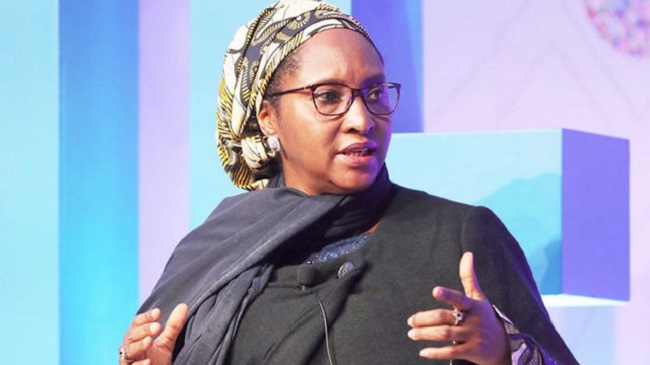President Muhammadu Buhari has so far supported states of the federation with a total sum of N5.03 trillion plus an additional US$3.4 billion since the inception of his administration.
The Minister of Finance, Budget and National Planning, Mrs Zainab Ahmed, disclosed this on Thursday while giving her ministry’s scorecard in the Ministerial briefing organized by the Minister of Information and Culture, Lai Mohammed, in Abuja.
She said each of the payments has different repayment terms while others were given as grants.
She remarked that the support covers a 13% Derivation Refund to Oil Producing States, refunds for the Construction of Federal Roads, and Ecological Support, among others.
The minister stated: “With respect to subnational governments, the FMFBNP goes over and above its statutory role to provide financial support to States:
“A total of N5.03 trillion plus an additional US$3.4 billion has been released to States by the Federal Government over the life of this administration.
“Each of these payments has distinct repayment terms with some given as grants and others as loans with favourable repayment terms including a long amortisation period.
“The support covers the 13% Derivation Refund to Oil Producing States, refunds for Construction of Federal Roads, Ecological Support, Support from the Development of Natural Resources Fund, Paris Club refunds, Support from the Stabilisation Fund, COVID intervention amongst others.”
The Minister gave a run down of revenues accruing to the federal government as of September 2022, totalling N4.19 trillion, 67.8% of the target.
She said the federal government’s share of oil revenues to fund the budget was N535.5 billion representing 32.6% performance, while non-oil tax revenues totalled N1.71 trillion an outturn of 100.7% compared to the budget projection.
Mrs Ahmed added that Non-oil revenues continue to outperform oil revenues with Company Income Tax (CIT) and Value Added Tax (VAT) as the top performers recording 131.2% and 99.8% of their respective targets.
On expenditures, she stated that the total expenditure to fund the 2022 budget is estimated at N17.32 trillion, noting however that, as of September 2022, spending fell short of the target by 16.4%. Of this amount.
She said 39% was allocated to Debt Service; 30% was utilised for Personnel costs, including Pensions; and 17% was released for Capital Investment.
The Minister maintained that the fiscal deficit for 2022 is estimated at N7.35 trillion with 92% of debt financing obtained from domestic sources.
She spoke of contemporary trends and global economic shocks that have impacted the nation’s economy including the Russia-Ukraine war affecting energy and food prices; high and rising inflation leading to cost-of-living crises, and economic slowdown in China and impact on global supply chains and tightening monetary policy in advanced economies causing currency depreciation and balance of payment pressures in Emerging Market and Developing Economies (EMDEs).
She explained: “Like most economies across the world, the Nigerian economy is challenged on many fronts. Factors impacting the current economic situation are driven by an interplay of external and internal causes which are manifesting in several ways:
“Narrowed fiscal space due to lower than anticipated oil revenues and continued subsidy on petrol; rising inflation due to higher fuel prices, rising food import prices and impact on transportation costs amongst other factors; the negative impact of insecurity on the domestic economy, and
increased likelihood of climate change events such as the recent flooding across the country and implications for lives, livelihoods and economic activity.”
She also noted the “Slowdown in the foreign portfolio and direct investments due to ‘flight to safety’ on the back of implementation of interest rate tightening by the US Fed to maintain price stability.”
According to her, while 2022 fiscal outturns were impacted by oil revenue performance, non-oil revenues rose.
Speaking on the main achievements of the Ministry of Finance, Budget and National Planning, she said to support domestic revenue mobilisation efforts, the Strategic Revenue Growth Initiative (SRGI) was introduced in January 2019.
According to her, “The non-oil revenue share of total FGN revenues to fund the budget increased from 30% to 73%. In particular, revenues collected by FIRS grew from N6 trillion for the 2021 fiscal year to N10 trillion from January to September 2022.
“Introduction of the annual Finance Acts as a fiscal tradition to support the annual budget in the delivery of the fiscal strategy of the government.
“As an omnibus bill, it complements our DRM strategies and stimulates investment in the Nigerian economy by allowing the targeting of specific provisions in extant tax laws impacting revenue generation and collection, tax administration and improvements to the business environment. The fourth in the series is under preparation.
“Launching of the Road Infrastructure Development And Refurbishment Investment Tax Credit Scheme (RITCS) in 2019 to leverage private sector capital and expertise to construct, repair and maintain critical road infrastructure in key economic corridors and industrial clusters. The President has approved 33 Road Projects, covering a total length of 1,564.95 km as of 2021. About N78.7 billion (about US$190 million) in tax credits have been issued thus far.
“Return of the budget cycle to a predictable January to December pattern.
“Improvement in the quality and transparency of the budget process resulting in Nigeria moving up 24 places in the global budget transparency index. Nigeria is amongst the first countries globally to develop and launch an Integrated National Financing Framework (INFF) to strengthen planning processes and mobilise domestic and international financing for Sustainable Development Goals and national development plans.
“Management of Nigeria’s external debt profile and all forms of external financing through the operations of the Debt Management Office, the International Economics Relations Department and the International Economic Cooperation Department.
“Restructuring of the Ministry of Finance Incorporated (MOFI) which manages GOEs and government-linked companies (GLCs) to drive value creation from different asset classes or investments of the FGN. MOFI’s current portfolio consists of 130 corporate entities valued at about N19 trillion.
“The goal in the next 10 years is to grow MOFI’s Assets Under Management (AUM) to about NGN 34 trillion and drive a minimum annualized average return of 15%.
“In respect of State Finances and Investment, the Ministry also facilitated the implementation of various Federal Government Intervention Schemes to Sub-nationals Facilitated Federal Government’s Intervention facilities for sectoral development in the States such as the Commercial Agricultural Credit Scheme (CACs), Health Care Support Facility, Differentiated Cash Reserved Requirement (DCRR) Facility and Several Bonds Issuance Programme.
“Monitoring and evaluation of the implementation of all approved Federal Executive Council/Ministerial Tenders Board capital projects of its agencies to improve transparency in federal government spending.
“In collaboration with other regulatory Agencies, the Ministry reviewed and issued the current Export/Import Guidelines in 2017 to make trade facilitation seamless and generate more revenue.
“The Ministry collaborated with relevant stakeholders in getting Mr President to sign an Executive Order (Eo1) on the Ease of Doing Business (EoDB), to achieve a reduction of the documentation requirements from 10-7 for exports and 14-8 for import activities.
“Facilitated the automation of Nigeria Export Proceed Form (NXP) on the TRMS in collaboration with CBN.
“The Ministry coordinates and aligns the operations of Banking and Financial Institutions by establishing financial relations between the Federal, State and Local Governments as well as parastatals and government-owned companies.
“The Ministry approved for Nigeria Export-Import (NEXIM) Bank to increase its share capital from N121 billion to N500 billion over the next five (5) years.
“In collaboration with AMCON, the Ministry was able to resolve a significant part of Eligible Bank Assets (EBA) disposable and recoveries of Non-Performing Loans.
“NDIC provided N113 billion to depositors of failed banks.
“Collaboration with the Ministry of Power in the implementation of the Presidential Power Initiative (PPI) between the Nigerian and German governments to resolve challenges in the power sector and expand capacity for future power needs through a partnership with Siemens AG. The aim is to modernise and increase the Nigerian electricity grid capacity from the existing 5GW to 25GW over three (3) phases.
“Substation equipment has been arriving in the country, contracts for upgrade of existing transmission substation and also for distribution lines (over 5000km) are at a very advanced stage of the award while financing negotiations with German Banks and Euler Hermes for the pilot project (62m Euros) are being concluded while those for the main project (2bn Euros) are progressing.”
Still, on key achievements, she added: “Highlights of the key achievements by the Ministry of Finance, Budget and National Planning, in line with its performance bond are as follows: Ensure full implementation of the Integrated Personnel and Payroll Information System (IPPIS) by all MDAs, including Educational and Security Agencies – A total of 723 MDAs has been enrolled into the IPPIS with an outstanding 5 MDAs from the targeted 728 yet to be enrolled.
“Optimize fiscal incentives to boost productivity in critical sectors, including Agriculture, Solid Minerals and Manufacturing – The Federal Government has disbursed N528,384,778,445.70 billion and supported a total of 233,974 MSMEs.
“Reconcile and monitor monthly revenues performance – A total of 1,700 MDAs submit monthly revenue performance reports.
oImplement Capital Markets Master Plan –
“The SEC recently launched a revised version of the 10-year Capital Market Masterplan in 2022 to reflect the dynamism of the market and developments in financial technology.
oFull deployment of GIFMIS to all MDAs and extension to other arms of Government – GIFMIS has been extended to the Armed Forces of Nigeria and Other Intelligence Communities. The target was 945 MDAs while the outturn was 823 MDAs.”
- ALSO READ FROM NIGERIAN TRIBUNE
WATCH TOP VIDEOS FROM NIGERIAN TRIBUNE TV
- Let’s Talk About SELF-AWARENESS
- Is Your Confidence Mistaken for Pride? Let’s talk about it
- Is Etiquette About Perfection…Or Just Not Being Rude?
- Top Psychologist Reveal 3 Signs You’re Struggling With Imposter Syndrome
- Do You Pick Up Work-Related Calls at Midnight or Never? Let’s Talk About Boundaries







